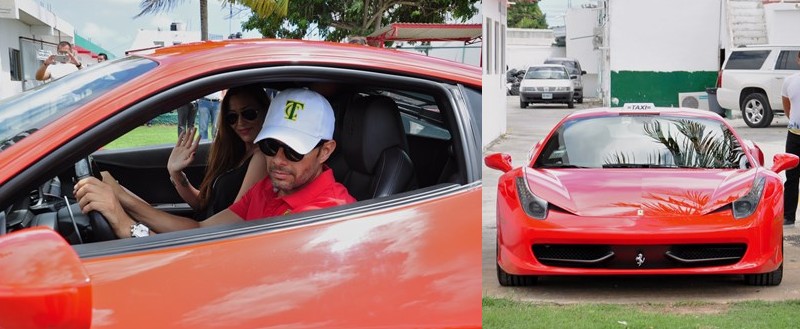Taxi drivers in Cancún are hoping a fleet of a “super-luxury” exotic cars on demand will help lure high-rolling tourists away from Uber in the Mexican city.
The “super-luxury service” will debut on 1 April through the Quiero Taxi Exótico app, (I Want an Exotic Taxi) and will let users pick from a selection of sports cars, including Lamborghinis, Ferraris and a vintage Mercedes-Benz 300 SL with butterfly doors.
“It’s key for competing openly against the transnational Uber, in spite of the fact the said company cannot operate in this city because it would cause anarchy in public transportation,” the Andrés Quintana Roo Taxi Union, which operates the Quiero Taxi Exótico app, said in a statement.
Union secretary general Eric Castillo said the service uses vehicles previously driven on a private track, and that the state government had granted special licences. The new cars add to an app-based service for regular cabs and luxury cars, such as BMWs, Mercedes Benz and limousines – all in an attempt to beat Uber at its own game, according to Castillo.
“We’re trying to find a way of not being crushed by Uber,” Castillo said in an interview. “We haven’t done things right for a lot of years [and] Uber is doing things better than any taxi fleet in the world,” he continued. “We cannot have people not having a better service – like Uber offers.”
The union added in a statement the service is using vehicles previously driven on a private track and granted special licenses by the state government. It also “fulfilled a commitment to the citizenry”, according to the union – even though it’s targeted towards tourists and wealthy customers.
Prices have not been announced, though Uber, which operates in 14 Mexican cities, recently reduced fares to expand into the lower-end of the Mexican market..
Uber’s arrival in Mexico has prompted protests from established taxi drivers – most of whom do not accept credit cards, offer receipts or use GPS. Mexico City taxi drivers caused traffic chaos last May by parking their cars in the streets in an attempt to force the local government to crackdown on Uber. The company reported an 800% increase in downloads of the Uber app in Mexico City on the day of the protests.
Earlier this month, taxi protests in Guadalajara turned violent, as drivers demanded the Jalisco state government impose regulations on Uber. Castillo called the tactics of clogging streets counterproductive, and said it does little more than making the taxi industry even more unpopular.
“It’s what we’re used to doing and people don’t like it,” he said. “I appreciate that Uber exists because it’s going to make us be better in the taxi industry.”
Taxis would at least have to match the competition, he said: “We cannot be less than Uber.”
Lawmakers in Quintana Roo, which included Cancún, have passed laws to outlaw Uber and similar services operating without a taxi medallion. The laws were swiftly approved, a reflection of the taxi union’s closeness with the Institutional Revolutionary Party (PRI), and its “electoral purposes” work of ferrying voters to the polls for the PRI every election day,” said Vicente Carrera, publisher of the Noticaribe website in Playa del Carmen.
“Many of the [taxi] plates belong government functionaries or ex-functionaries,” Carrera added.
guardian.co.uk © Guardian News & Media Limited 2010
Published via the Guardian News Feed plugin for WordPress.


